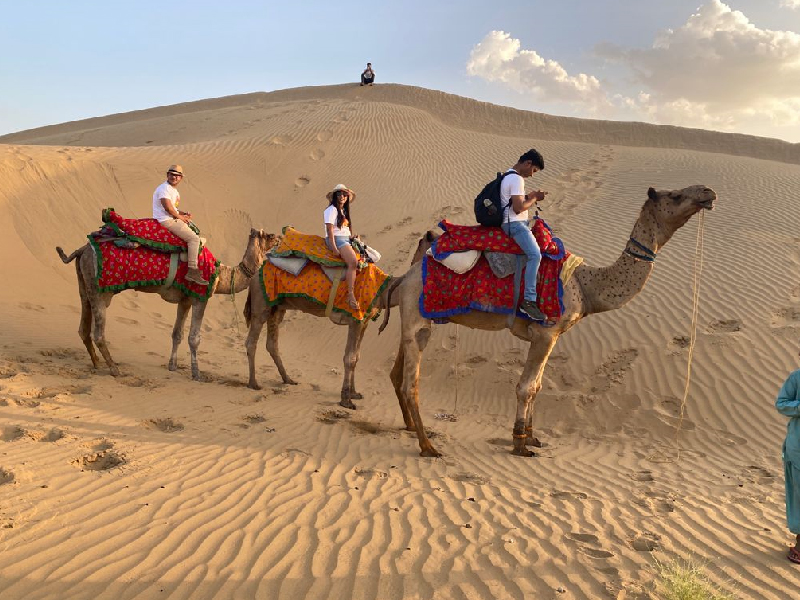Cultural Encounters on a Jaisalmer Camel Safari
Cultural Encounters on a Jaisalmer Camel Safari
Blog Article

When you think of Rajasthan, the image of golden sands, majestic forts, and colorful turbans might come to mind—and no place brings this vision to life quite like Jaisalmer, the Golden City. While its stunning architecture and historical landmarks are a major draw, one of the most immersive and unforgettable experiences you can have here is a Camel Safari in Jaisalmer.
But a camel safari isn’t just about riding through sand dunes—it’s a journey into the heart of Rajasthani culture, where you’ll encounter centuries-old traditions, warm hospitality, and local life far from the tourist crowds. With the help of expertly organized Jaisalmer sightseeing tours, you can turn your desert ride into a deep cultural exploration.
1. The Camel: More Than Just a Ride
In Rajasthan, camels are affectionately known as the "ships of the desert." They’re not just animals used for transport—they’re woven into the cultural and economic fabric of desert life. On your camel safari, you’ll get to know these gentle creatures, often decorated with colorful saddles, bells, and embroidered accessories.
Your camel driver (or “Raika”, as they’re traditionally called) may even share stories of how these animals have been used for centuries—for farming, trade, weddings, and royal parades. The bond between man and camel is something that adds a deeply human touch to the experience.
2. Visiting Traditional Desert Villages
One of the most enriching aspects of a Camel Safari in Jaisalmer is the opportunity to visit remote desert villages that remain untouched by modernity. Villages like Barna, Khuri, and Kuldhara offer a window into rural life—where homes are made of mud and dung, and people still rely on age-old methods for farming, cooking, and crafts.
Many Jaisalmer sightseeing tours include these village visits as part of the camel safari route. You might be invited into a local home for a cup of chai or witness how villagers make pottery, weave textiles, or cook over open fires. It’s not a performance—it’s real life, and it's happening just as it has for generations.
3. Folk Music and Dance in the Desert
When the sun dips below the horizon and the desert begins to cool, the real magic starts. Most overnight camel safaris include a stay at a desert camp, where cultural evenings come alive with Rajasthani folk music and dance. Dancers in swirling ghagras perform the Ghoomar or Kalbeliya, while musicians play traditional instruments like the sarangi and khartal by firelight.
These performances aren’t just for entertainment—they're storytelling traditions that carry the history and spirit of Rajasthan. Whether you join in the dancing or simply sit back with a cup of masala chai, it’s a cultural moment you’ll never forget.
4. Savoring Authentic Rajasthani Cuisine
Food is a huge part of any cultural experience, and on your Camel Safari in Jaisalmer, you’ll get to enjoy meals cooked the traditional way—on open fires under the stars. Typical dishes include dal bati churma, ker sangri, gatte ki sabzi, and bajre ki roti, served with homemade pickles and cooling buttermilk.
Eating in the desert, with no restaurants in sight and the silence of the dunes around you, is a unique and grounding experience. Some safari operators even offer cooking demos, where you can learn how these dishes are made using local spices and techniques.
5. Storytelling and Local Legends
Your camel guides are often storytellers at heart. During your ride or by the campfire, they might share folktales about desert spirits, Rajput warriors, and ancient temples hidden in the dunes. One popular stop is the abandoned village of Kuldhara, shrouded in mystery and legends of curses.
These stories, passed down through generations, add layers of meaning to the landscapes you’re exploring. They're not written in guidebooks—they're part of the oral tradition that makes Jaisalmer sightseeing tours all the more enriching.
6. Handicrafts and Desert Artisans
During village stops or visits to local markets before or after your safari, you’ll come across local artisans who specialize in embroidery, mirror work, pottery, and leather goods. Supporting these crafts not only gets you a beautiful souvenir but also helps preserve traditional skills that are slowly fading in a modernizing world.
Many travel agencies and safari organizers now include visits to artisan co-operatives or even short workshops where you can try your hand at block printing or jewelry-making.
7. Responsible Cultural Tourism
A growing number of camel safari operators are focusing on eco-friendly and ethical tourism, ensuring that the culture being shared is respected, not exploited. When you book through a reliable tour provider or a professional Jaisalmer sightseeing tour company, you’re more likely to enjoy authentic experiences that benefit both visitors and local communities.
Look for tours that:
- Limit group sizes
- Employ local guides and musicians
- Support village-based stays
- Practice animal welfare and eco-conscious camping
Conclusion
A Camel Safari in Jaisalmer isn’t just about riding across the sand—it’s a gateway to Rajasthan’s soul. Every step through the desert connects you with ancient customs, colorful people, timeless music, and stories that make this region one of the richest cultural destinations in the world.
By choosing a well-curated Jaisalmer sightseeing tour, you ensure that your desert adventure is not only fun but also meaningful—supporting the local economy and bringing you closer to a culture that’s both vibrant and resilient.
So pack your bags, bring your curiosity, and get ready for a cultural journey like no other—on the back of a camel, across the timeless dunes of Jaisalmer. Report this page